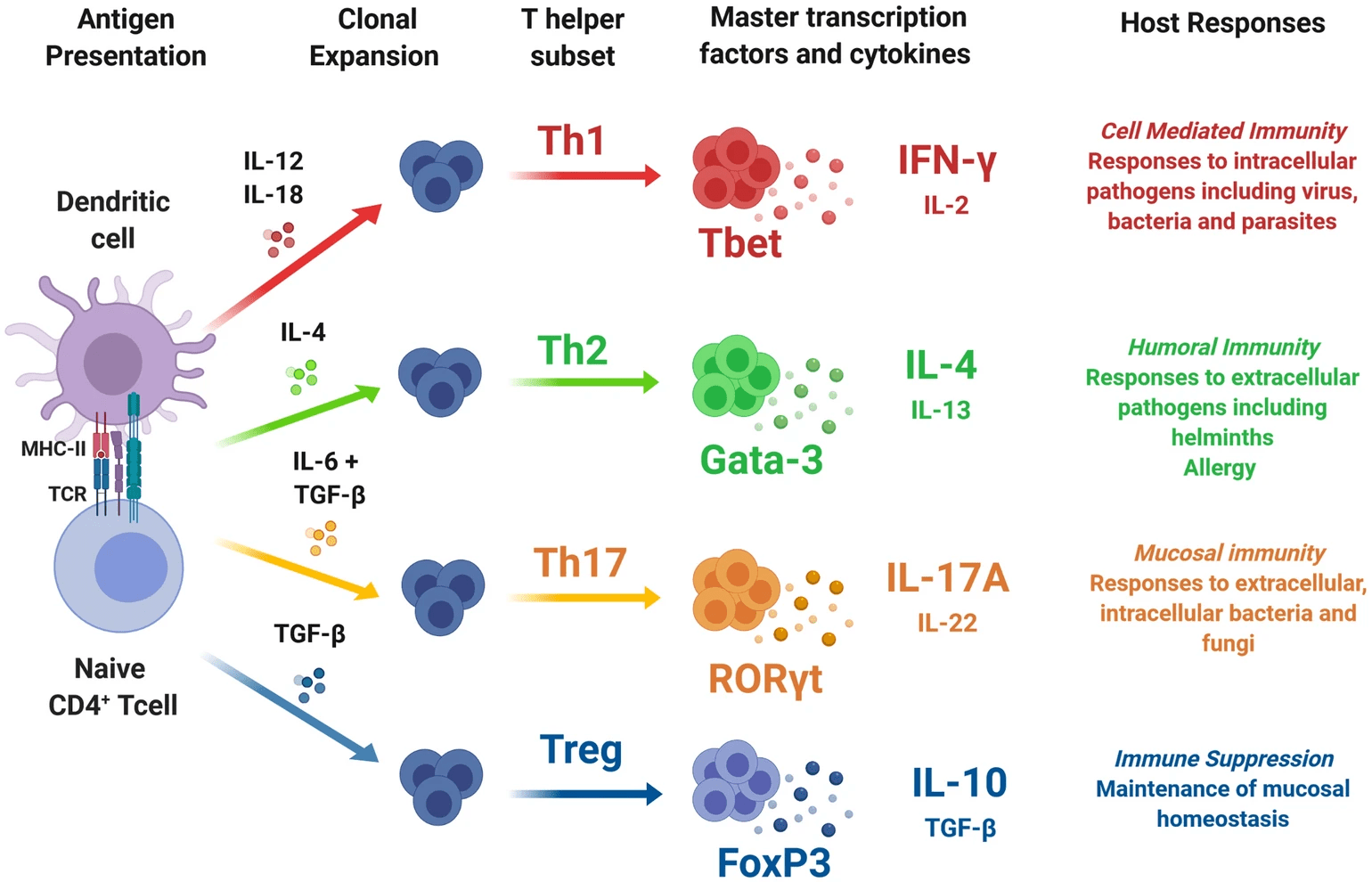
Factually inaccurate: Th2 cells cannot create antibodies, as Lake claimed. Antibody-producing cells are B cells, a subset of immune cells that has a different developmental pathway and biological function from T cells.

FULL CLAIM: “the number 1 indicator of parasites is actually an autoimmune condition, so things like MS, celiac disease, fibromyalgia, Hashimoto’s can all be linked back to parasite activity”; parasites “stimulate Th2 immune cells which actually create antibodies” and “suppress Th1 cells which are a part of your innate immune system”
REVIEW
A TikTok video posted on 23 June 2023 claimed that “the number 1 indicator of parasites is actually an autoimmune condition”. This claim was made by Austin Lake, who introduced himself as a “functional medicine practitioner” in the video. Lake’s LinkedIn profile indicated that he holds a doctorate in physical therapy, but no qualifications to practice medicine.
The TikTok video was viewed more than 317,000 times and received more than 11,000 likes to date. A copy of the video was also uploaded by the Facebook page WOW PBX, which has more than 140,000 followers. The video received more than 57,000 views to date.
Lake also claimed that parasitic infections “stimulate Th2 immune cells which actually create antibodies” and “suppress Th1 cells which are a part of your innate immune system”.
However, Lake’s claim that autoimmunity in general can be traced back to parasitic infections isn’t substantiated by evidence, and his claims about Th1 and Th2 cells inaccurately describe immunological concepts, as we will explain below.
No evidence that parasitic infection is associated with autoimmunity in general
Broadly speaking, autoimmunity occurs when the body’s immune system mistakenly attacks normal cells in the body. However, autoimmune diseases don’t all manifest in the same way and the risk factors for developing one autoimmune disease aren’t always the same as for another. Lake named several conditions in his video, including multiple sclerosis, celiac disease, Hashimoto’s disease, and fibromyalgia, none of which are caused by parasites.
In multiple sclerosis (MS), the immune system attacks myelin, a fatty substance that coats and insulates neurons (nerve cells), permitting electrical signals to travel to and from the brain. This interferes with the transmission of electrical signals and can lead to a wide range of potential symptoms, including motor problems and vision problems. The U.S. National Institute of Neurological Disorders and Stroke states that known risk factors for MS are a genetic predisposition, infection by the Epstein-Barr virus, and a lack of vitamin D.
Interestingly, some research suggests that infection by certain parasites lowers the risk of MS instead of increasing it. The Multiple Sclerosis Association of America (MSAA) stated that “Parasites are a possible risk-reduction factor in the development of MS”:
“The parasites in this instance are ‘helminths,’ which refer to a wide variety of worms. Some are thought to be harmless, and many people had pinworms as children. Research has found that parasites can modulate the immune system and dampen its responses. People who have parasites are less likely to be diagnosed with MS.”
Still, there are important caveats that the U.K. non-profit Multiple Sclerosis Trust highlighted. For example, studies about the effects of parasites on MS are small and have produced mixed results. Therefore, more research still needs to be done to better understand the relationship between MS risk and parasitic infection.
Celiac disease is a condition in which gluten in the diet triggers the immune system to attack the small intestine. It can affect the body’s ability to absorb nutrients and, in severe cases, lead to malnutrition. According to the U.S. National Institute of Diabetes and Digestive and Kidney Diseases, celiac disease is linked to certain genes. Having celiac disease also increases a person’s risk of developing other autoimmune diseases, such as lupus.
In Hashimoto’s disease, the immune system attacks the thyroid gland. The disease commonly leads to a fall in thyroid hormones that regulate how our body uses energy, causing symptoms like fatigue, weight gain, and cold sensitivity. The disease tends to run in families, suggesting that, like other autoimmune diseases, certain genes influence a person’s risk of developing Hashimoto’s.
Fibromyalgia is a chronic pain condition that can lead to fatigue, sleep problems, cognitive problems, and depression. Risk factors include having the autoimmune diseases lupus and rheumatoid arthritis. There’s uncertainty over the disease process that gives rise to fibromyalgia. The American College of Rheumatology doesn’t consider fibromyalgia an autoimmune disease.
That said, a recent study suggested that an immune response could indeed contribute to fibromyalgia symptoms. A study published in 2021 in the Journal of Clinical Investigation found that infusing antibodies taken from fibromyalgia patients into mice generated symptoms suggestive of those seen in fibromyalgia, such as reduced grip strength and movement[1]. The authors postulated that therapies blocking such antibodies might help treat fibromyalgia.
Overall, certain genes, viral infections, and environmental factors have been associated with various autoimmune diseases. However, there’s no evidence supporting Lake’s claim that “the number 1 indicator of parasites is actually an autoimmune condition”.
B cells produce antibodies, not Th2 cells; Th1 cells aren’t part of the innate immune system
Th cells, or T helper cells, play an important role in orchestrating the immune response. They can broadly be divided into two types: Th1 and Th2. Generally, Th1 cells support cells that work to kill pathogens (cell-mediated immunity), while Th2 cells secrete chemicals and other substances to combat pathogens (humoral immunity) (see Figure 1).

Figure 1. An overview of the development of different T helper cells. Different combinations of secreted chemicals and proteins help to drive the development of a naive T cell into different types of T helper cells. Source: Corripio-Miyar et al.
Contrary to Lake’s claim, T cells don’t produce antibodies; this function belongs to B cells.
The innate immune system refers to the part of the immune system that is the body’s first line of defense against harmful microorganisms (pathogens). These include the skin, mucus, and certain immune cells like neutrophils.
Then there is the adaptive immune system, which includes T and B cells. Compared to the innate immune system, it takes the adaptive immune system more time to mount a response against a pathogen. However, unlike the innate immune system which is non-specific, the adaptive immune system can generate a response that is specific to the pathogen.
Neither system operates in isolation and there are ways for both sides to communicate. For example, dendritic cells collect information from the environment in the form of antigens, which they process and present to T cells, stimulating T cell development. Nevertheless, contrary to Lake’s claim, Th1 cells, or indeed T cells in general, are considered part of the adaptive immune system rather than the innate immune system.
Conclusion
In summary, the scientific evidence so far has shown that different autoimmune diseases can arise as a result of a genetic predisposition combined with other factors such as viral infection. However, there’s no evidence showing that parasitic infection causes autoimmunity. Antibody-producing cells in the body are known as B cells, which is functionally distinct from Th2 cells which don’t produce antibodies.
REFERENCES
- 1 – Goebel et al. (2021) Passive transfer of fibromyalgia symptoms from patients to mice. Journal of Clinical Investigation.


